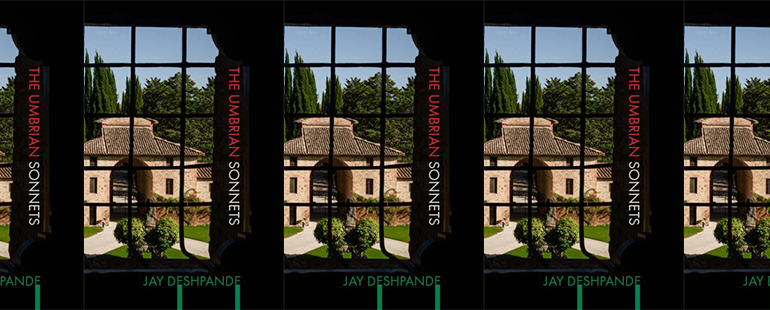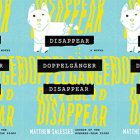“Sometimes the poems know things that we don’t know ourselves”: An Interview with Jay Deshpande

The edge of a lover’s mouth; sculptures curving away from the viewer; a loaf of dough expanding in the oven; a body stretched out like a fence. The poems in Jay Deshpande’s debut collection, Love the Stranger (2015), are filled with images of liminality, of distance and reaching, of borders, both defined and blurred, between bodies, between spaces in nature and in the mind. In the opening poem, “Apologia Pro Vita Sua,” Deshpande writes of the edge of a forest remembered from his childhood: “But I never touched it. / It seems I am always running ahead of my needing, / looking out from a higher window of the body / to see the edges of things.” For Deshpande, distance is not only an embodiment of the ineffable, but a poetic ethos of its own.
The relationship between distance and sight is crucial in these poems. Deshpande is intensely interested in the lyric and makes great use of its ability to zero in on an image or moment in time: the moon on a coyote’s coat; the wind lifting a horse’s mane; the sound of a woman’s hair. At the same time as he forces us to examine these details up close, he also consciously distances us from ideas and experiences with which we might have assumed familiarity. His poems frequently explore love, tenderness, and masculinity’s fraught position in relation to these ideas, yet his idiosyncratic turns of phrase and choice in imagery invite the reader to encounter such concepts afresh.
A musician before he became a poet, Deshpande has a great amount of love and respect for jazz, evident in the twelve poems in the collection entitled “Chet Baker,” after the legendary trumpeter and vocalist. There is another, subtler way in which his work takes inspiration from jazz and the art of improvisation, and that is in his spontaneous leaps from image to image, line to line, which work on the reader the way music does on the listener, in an indecipherable, indefinable mode of communication. Deshpande’s poetic project involves distancing us from language itself, inviting us to see what was familiar—and therefore overlooked—as a stranger.
This striving to convey the inexpressible pervades Deshpande’s work beyond his first collection, including his most recent chapbook, The Umbrian Sonnets (2020). This group of poems is preoccupied with another sort of striving as well: that towards the ethical. Deshpande composed the sequence of sonnets within his 2018 residency at Civitella Ranieri in Umbria, which coincided with the implementation of the Trump administration’s unbearably cruel family separation policy at the U.S.-Mexico border. Deshpande set before himself the monumental challenge of reconciling the “beautifying impulse” of his poetry with the ugly realities of an unjust world.
“Sonnet xv” poses the question, “And why beauty? Why build a life around / the leaving that sustains? Is it ethical?” While the sonnets are compelling and often powerful standalone pieces, perhaps the most remarkable aspect of this work is how the poems build on and speak to one another to answer that haunting question. The speaker of the poems prevaricates and doubts, shirks and reprimands, and grapples, with self-effacing honesty, with issues that at once demand witness and defy adequate representation. In this regard, unimaginably inhumane actions are not so different from the sun-drenched Italian countryside; both cry out for the poet’s attention, and both remain just beyond the reach of language. In short, the poet sets himself to an impossible task no matter the subject matter he chooses. It is in the striving, however, that he finds meaning. By the last few sonnets of the sequence, the speaker reaches the conclusion that future poems will be “always seeking / the best way to speak the necessary” and “will want to stay true”; there is no end to this struggle, no neat resolution.
The final sonnet, “Also, unnumbered, hovering:” declares, “If you must fetishize / something, fetishize the novice.” The novice, after all, sees everything with new eyes, as a stranger to the world. Deshpande boldly allows himself to be a novice in the face of each poetic undertaking, and it is precisely this attitude that lends his poetry its mature voice and leads to its insights. Recognizing the ephemerality of such wisdoms, he allows the poems to exist as monuments to them, that we might return to them in the future and experience their lessons anew.
C. A. Munn: The poems in your first collection, Love the Stranger, often deal with abstract and psychological subjects, like love or distraction, but the poems feel very grounded in the body. Does your relationship with your body figure into your poetic process, and has that changed over the past year?
Jay Deshpande: I find that as time goes by, I think more about prosody and how a poem ends up being an embodied experience and a moment that’s held off from the rest of the world. I think that’s part of what a lyric poem can be: this moment of intensity in language that can be felt in the body. Living in the Bay Area under lockdown, about a year ago, there were weeks where I didn’t go outside at all. It got to a point where when I would take the trash out at night, just smelling the air became such a transfigurative experience that I found myself reciting Frank Stanford’s poem “The Morning.” It begins, “Air, I love you, / like a bride / Loving her body, the madman the desert, / The horse its shadow on the field.” Just reciting that sentence, when I went outside and breathed the air, was a poetic experience, but it was fundamentally an embodied experience that demanded poetry.
CAM: In your poem “Eclogue with Animus,” you write, “the body / cries out when it learns it is here for love, / and is the stranger for this calling.” How do you feel the presence of “the stranger” in these poems?
JD: For a long time, I was really interested in defamiliarization as an aesthetic possibility. This comes out of Russian formalism. Viktor Shklovsky writes in his essay “Art as Technique” about the idea of estrangement or defamiliarization as a way to make things more alive. Shklovsky talks about the point of art being to make the stone stony. To have that sort of tactile experience requires some distance from the things that we think we already know. So with something like love, which seems like an ethic or something immediate and around us all the time, I was interested in how to make a feeling stranger, in order for us to encounter it with a freshness and think of it as a new introduction. That can be a figure, that can be the lover, that can be the idea of a stranger to us in any way.
CAM: There’s a section in your book called Chet Baker, in which every poem is titled “Chet Baker.” What draws you to this particular artist? What unites the Baker poems with their namesake?
JD: I grew up in a house listening to Chet Baker a lot. He was my inroad to certain kinds of love songs and ballads that are very important to the jazz canon. They also shape a lot of ideas about rhetoric in songs, ideas that were then deep inside my understanding of music or of a romantic statement. In terms of the composition here, I felt impelled to find a way for him to enter the poems that I was writing at the time. There’s a gravitation and an intensity that would enter around the name. It was a kind of mythmaking that I was doing, to use a figure and to incorporate them obsessively. I was interested in the poems being named “Chet Baker,” but not about Chet Baker and not in his voice, or not ekphrastic poems off of his music, but for the name to hang in the air and tremble, and then see where the poem would go from that.
CAM: You have a background in playing jazz, as well. Do you see similarities between jazz and poetry, or important differences? Has your musical background informed your poetry?
JD: I came to writing through music and I still come back to thinking about, What is it that I love about jazz? There’s something about improvisation as a kind of communication. It’s really interesting to think about making a statement that’s not in an easily relatable language, [that’s in] a communicative form that we can’t exactly transmit information in, in the same way we can with a language that we live inside of continually. That’s the problem with poetry. It’s an art form that’s trying to get beyond the statements that we can make in words, in our normal discursive way, but still using those tools. I find that jazz serves as a model for a kind of expression that moves into the ineffable in a way that I think poetry sometimes can, but is constantly trying to reach towards.
The non-spatial art forms are the ones where we can experience our own mortality, in a very profound way, even though it’s always an analog for that, a metaphor. We’re not thinking about that directly as we listen to the last strains of the guitar fade out or as a poem comes to its close, and there’s silence in the room afterwards; but those are moments that we’re engaged with some sort of intensity that’s followed by a kind of grief. Giorgio Agamben has an essay, “The End of the Poem,” where he talks about the power of a poem or what makes a poem a distinct form—it ends and we lapse back into the world of prose. The shifts occurring at those moments are analogs for mortality.
CAM: I’d like to turn to your chapbook, The Umbrian Sonnets. In your author’s note, you set yourself to an ambitious task: to account for both the beautifying impulse of poetry and the very real ugliness of current events and complicity in American empire. Do you feel you succeeded?
JD: I was setting myself to this work, but with no sense that I could account for it. It was a striving towards acknowledgment, using sonnets as a way to engage with the self. I wanted to contend with my own beautifying impulses and examine the desire to make a poem this perfectly crafted work. Trying to face the world or witness the world in any way is messier than that. I have no illusions about it succeeding. But the project is about the trajectory, or pushing towards that.
There is a way in which the poems try to engage with these challenges and then fail or run away from them, or try to find a way around. I was interested in the struggle of how to engage with the world. How does my noticing and my image-making and my consciousness of being in this body in this moment, in this place, relate to the world beyond the insularity that can sometimes happen in a lyric poem or a love poem? I wanted the poems to move towards and away from that self-consciousness. One of the ways that we often experience a real obsession in our thinking is not just by its continual persistence, but by the way that it slips away and then returns. When something returns, it’s haunting us. So I wanted to also have room for fancy and all the other things that would go into the work, and then have that sense of return as being beset by these ideas.
CAM: What does it mean to you to be an ethical poet? Is there room for other pursuits alongside the ethical in art?
JD: I think about art as inherently ethical in the sense that an experience of attention is ethical, and an experience of the imagination for the maker and for the person experiencing the work is ethical, in that it allows for more things to happen in the world. That doesn’t mean that it leads to some sort of greater ethics or a utopia. It doesn’t mean that it brings down systems of power and patriarchy and violence that we are living inside in this country and in this world. I don’t have illusions about poetry doing that, but I think that there’s a larger ethics that’s simply in the experience of art. Our engagement with it has something that’s potentially moving towards a broad idea of the good.
One of the books that was affecting me while I was working on The Umbrian Sonnets was Elaine Scarry’s On Beauty and Being Just, which is a philosophical and aesthetic and political consideration, all at once, from an academic space, but not too academic. Scarry presents a lot of ideas about what art does and why beauty is important, rather than just being a tried and true convention that poems are made towards. She talks about the idea of propagation, that beauty prompts a copy of itself. We see a beautiful painting or a beautiful face, and we want to approximate it or render it or imitate it or stay within its presence, and there’s ethics within it.
There are lots of complications too, but there are ways that attention moves towards possibilities that I think are in the realm of the good.
CAM: Has your perspective on The Umbrian Sonnets changed since it was published? Now that we’re in the COVID-19 era, has that impacted your relationship with the poems?
JD: No matter what, the feelings about poems are going to keep changing after they’re out in the world. My friend, the poet Montana Ray, once said, “A book is a very good place for poems to die.” They’re alive while you’re working on them. And then that’s a good place to let them be, but the feelings keep changing in that afterlife. To be able to make poems and be excited about them, I can’t be too conscious of how they’re going to exist in the world. That level of self-consciousness usually incapacitates my process for writing or for authentic feeling.
I’m okay with the poem being of a moment and not eternal. Of course, I’m grappling with my own egoic wishes for glory and immortality, but the poet Jane Hirshfield once said to me that we don’t really get remembered. At most, for the great poets, the greatest poets, there are four or five poems of theirs that are recalled. They put us in the ground. These things are not meant to last forever. The strange ecosystems by which people find poems and find intimacy and connection with poems, and with art generally, happen in so many ways that we can’t understand.
Sometimes I do want a monument to a moment in time, or to a feeling or an idea that feels eternal when I am in it, which might just be in the act of making a poem; but I don’t have illusions about them lasting.
CAM: In the final, unnumbered sonnet, you write, “No wisdom from the last work will pertain / to the new.” Has this held true in your experience?
JD: Yes, I think that’s true. It feels like a continual struggle with reinvention and with the fear of, What am I now? What do I make now? What matters now? But it’s interesting how whenever I come to a moment that feels like a kind of truth or vividness in that process, it’s generally in recognizing that I don’t know what I’m doing or that I can’t rest on anything I’ve made before. That said, I find that very hard to hold in mind because I want to believe that I can keep doing the same thing and it’ll just get better. In that last floating, unnumbered sonnet, I needed that triangulation. Sometimes the poems know things that we don’t know ourselves. It’s useful when the poem could be a monument to a wisdom that I know I’ll fall away from. A poem is smarter than us, so it has that opportunity to teach us something that we need to learn over and over again.
This piece was originally published on June 30, 2021.



